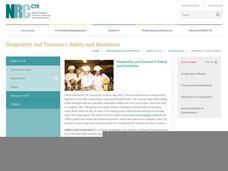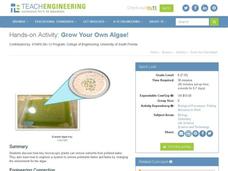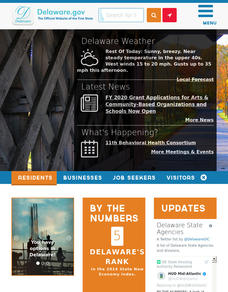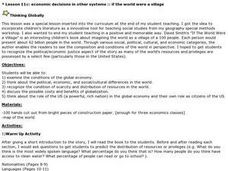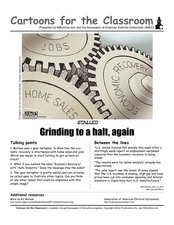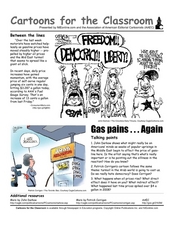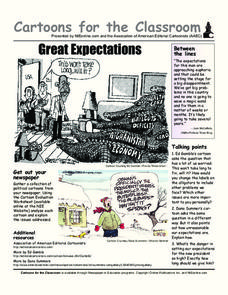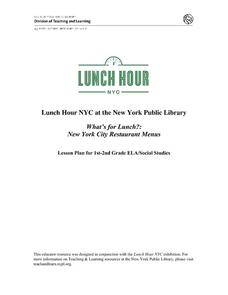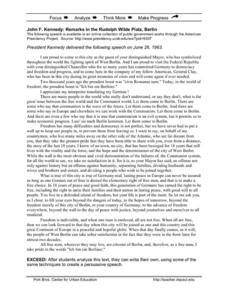Curated OER
Using Poetry in Teaching Reading to Special Education Students
A series of well-written activities, these lessons prompt middle schoolers reading below grade level (at a second, third, or fourth grade level) to use poetry to practice basic reading skills. They rhyme, build words, make inferences,...
National Research Center for Career and Technical Education
Hospitality and Tourism 1: Safety and Sanitation
Math and science come alive in this career-related instructional activity on sanitation. Along the way, learners explore bacterial growth rates using exponential notation and graphs. A link to a very brief, but vivid video shows just how...
National Research Center for Career and Technical Education
Hospitality and Tourism 2: Costing
The lesson plan provides a richly detailed narrative and sample problems for teaching or reinforcing how to work with percentages. In particular, your audience will compute the costs per serving of food and simulate setting menu prices...
National Research Center for Career and Technical Education
Transportation, Distribution, and Logistics: Tire and Wheel Assemblies
Is bigger really better? By the end of this lesson, learners will be able to apply formulas for computing the diameter of tires and wheel assemblies. Begin by showing a slide presentation that will review definitions for radius and...
Curated OER
An Exploration of Cradle-to-Cradle Design Thinking
Introduce cradle-to-cradle design thinking. Scholars first discuss the importance of natural laws and rights. They then use a variety of online and print resources to research eco-efficiency and cradle-to-cradle design.
TED-Ed
A Brief History of Religion in Art
Did you know that some languages have no word for art? The English language does and the narrator of this short video discusses the aesthetic dimension of religious art as it "visually communicates meaning beyond language."
Teach Engineering
Grow Your Own Algae!
Develop a model of a wastewater treatment center. The last activity of the unit has pupils mix a lake water sample into a tank of water containing fertilizers. Over time, the algae from the lake water grows and removes the nutrient-rich...
ProCon
Is Homework Beneficial?
Does homework improve student achievement, or does it increase stress? Scholars use the included debate topics website to prepare for a class discussion or debate about whether homework is advantageous. After reading a brief background...
Curated OER
Texas Recycles Day: A Sample School-Wide Environmental Event
Students participate in a recycles day. They research how recycling benefits the environment. They also compete in a paper products recycling contest.
Curated OER
The Underground Railroad
Eleventh graders work in teams to play a game that is based on the Underground Railroad in Delaware.
Curated OER
Evaluating Web Sites
Fifth graders discuss different aspects of web sites to determine what makes an appropriate one. They complete a web quest before evaluating a number of web sites based on Dr. Everhart's, Web Evaluation Worksheet.
Curated OER
Myth and Truth: The First Thanksgiving
Encourage learners to think critically about common myths regarding the Wampanoag Indians in Colonial America. They discover that behind every myth are many possible explanations—and that learning more about American history helps them...
Curated OER
If the World Were a Village...
Your class members explore concept that the world is a large place, examine how statistics can be used to help in understanding the world and its people, and create illustrations or graphs of statistics found in the award-winning...
Curated OER
Cartoons for the Classroom: Grinding to a Halt- The U.S. Economy
Using gears as a visual metaphor, this political cartoon analysis worksheet gives a clear picture of one artist's perspective on the U.S. economy. Background information helps give pupils access to the cartoon's context, and 3 talking...
Curated OER
Cartoons in the Classroom: Gas Pains Again
The price of gas has increased around the country, and many political cartoons, such as this one, have used humor to get people thinking about it. With the help of three very good critical thinking prompts, learners will analyze a...
Curated OER
Cartoons for the Classroom: What's Next in 2011?
Examine the toolbox of political cartoons with this analysis handout, which features a cartoon utilizing satire, sarcasm, and irony as it predicts the current events of 2011. Interestingly, this will also serve to get scholars looking...
Curated OER
Cartoons for the Classroom: Great Expectations
Learners can use this worksheet to discuss the expectations placed on the Obama presidency. Included are two cartoons to analyze, a web site to visit, several great discussion questions, and a short activity. This is one worksheet that...
Curated OER
Cartoons for the Classroom: Stand By for Regime Change
When Barak Obama was elected president, he was unable to affect change untill the official start date of January 20th. Learners examine this policy, America's need for change, and the duties of the president-elect in a political cartoon...
Curated OER
Cartoons for the Classroom: Campaign Echoes
Get on those thinking caps, because your class is going to analyze a political cartoon related to the 2008 presidential elections. Included is a large image of the cartoon, background information, and three guiding questions which can be...
Curated OER
Cartoons for the Classroom: Social Commentary
Expose your class to the genre of political cartoons less concerned with serious political issues. This political cartoon analysis handout features social commentary on the many entertainments of youth, ironically paired with their...
New York Public Library
What's for Lunch?: New York City Restaurant Menus
Do you remember the days when a cup of coffee cost five cents? At A.W. Dennett restaurant in 1894, you could buy a five-cent cup of coffee and as well as a five-cent slice of pie to accompany it. The menu from that year is a primary...
Polk Bros Foundation
John F. Kennedy: Remarks in the Rudolph Wilde Platz, Berlin
“Ich bin ein Berliner.” Here’s the full text of John F. Kennedy’s famous address delivered to the people of Berlin on June 26, 1963. The resource could be used as part of a study of Kennedy’s presidency, of rhetorical devices, or as...
Teach Engineering
Acoustic Mirrors
Investigate sound waves with acoustic mirrors. Using audio software, groups make recordings of musical instruments, both with and without acoustic mirrors. They compare the recordings to see the effect of acoustic mirrors on sound waves.



